Elon Musk anticipated it: Tesla products would become the world’s most popular cars in the near future. He was not wrong. Last year, the Tesla Model 3 was among the world’s top 10 best-selling cars according to my own research and data for 106 markets. They represented 99.32% of the total last year.
The protagonists:
- Tesla Model 3, hits the top 10 and keeps climbing. It should hit the top 5 by the end of this year.
- Toyota RAV4 outsells the Corolla, and becomes the first ever SUV to achieve this position.
- Toyota Hilux gets more traction thanks to its strong position in many developing markets.
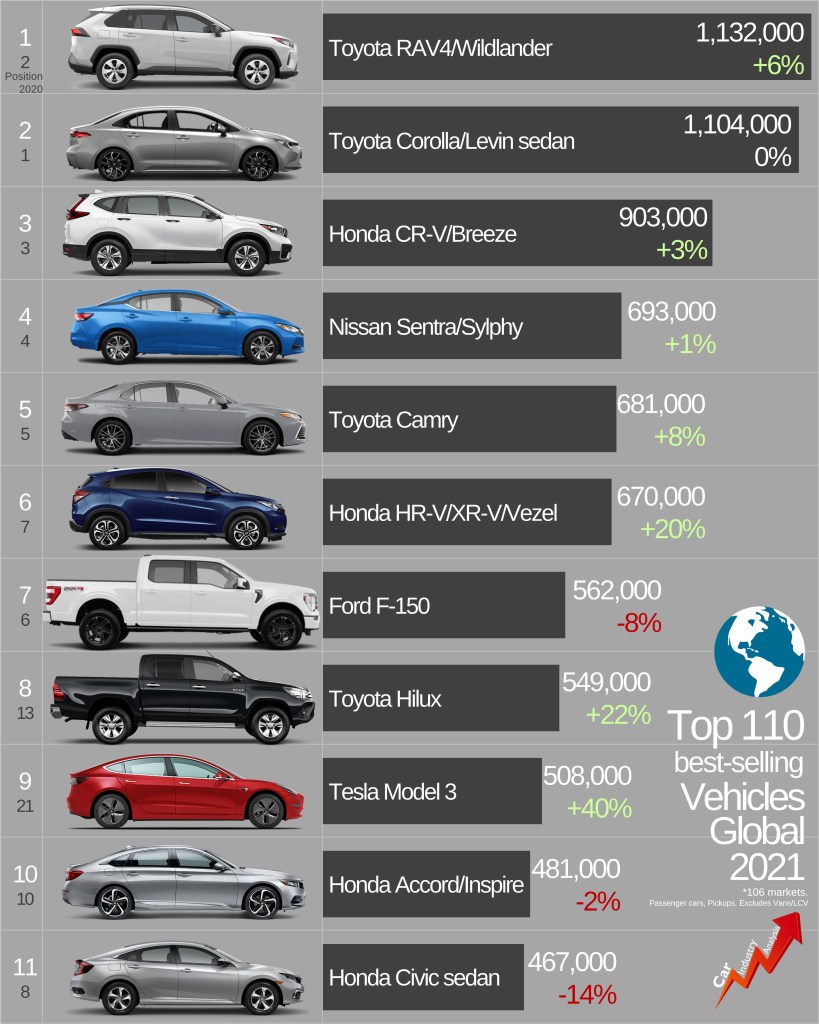
- Toyota Highlander gains more traction than ever thanks to the latest generation, also available in China.
- Tesla Model Y in top 20. It is expected to outsell the Model 3 by the end of this year.
- Wuling Hongguang Mini EV proves that an affordable EV can be a big success.
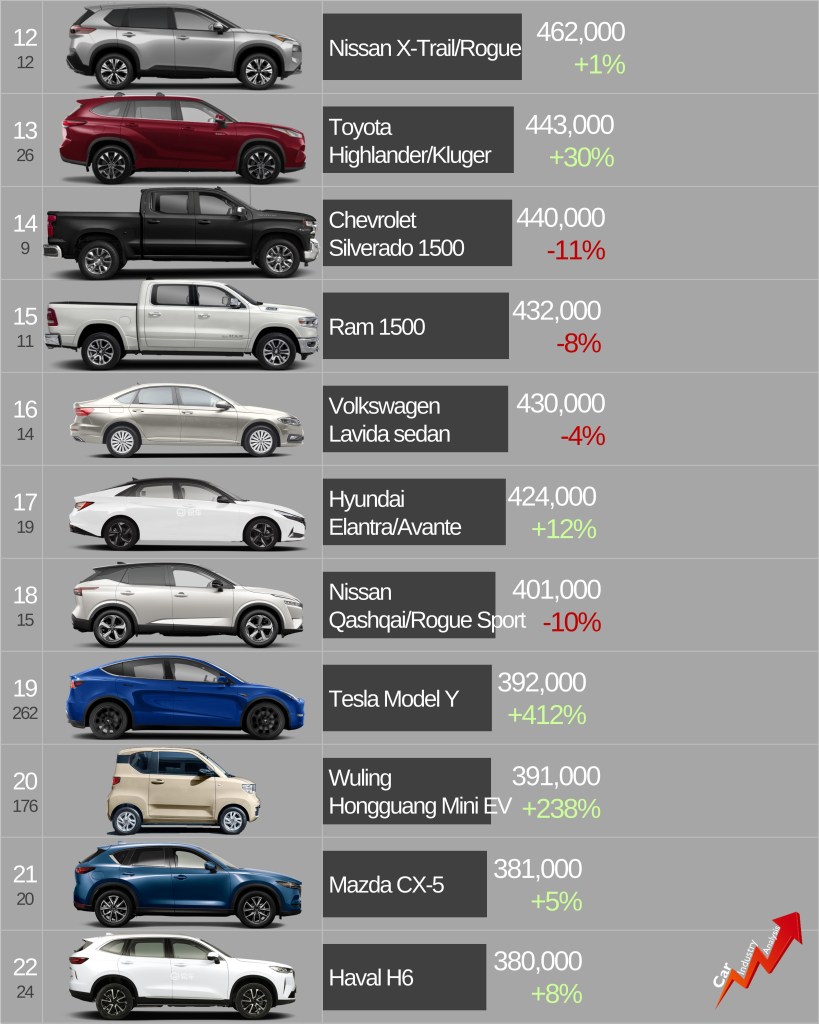
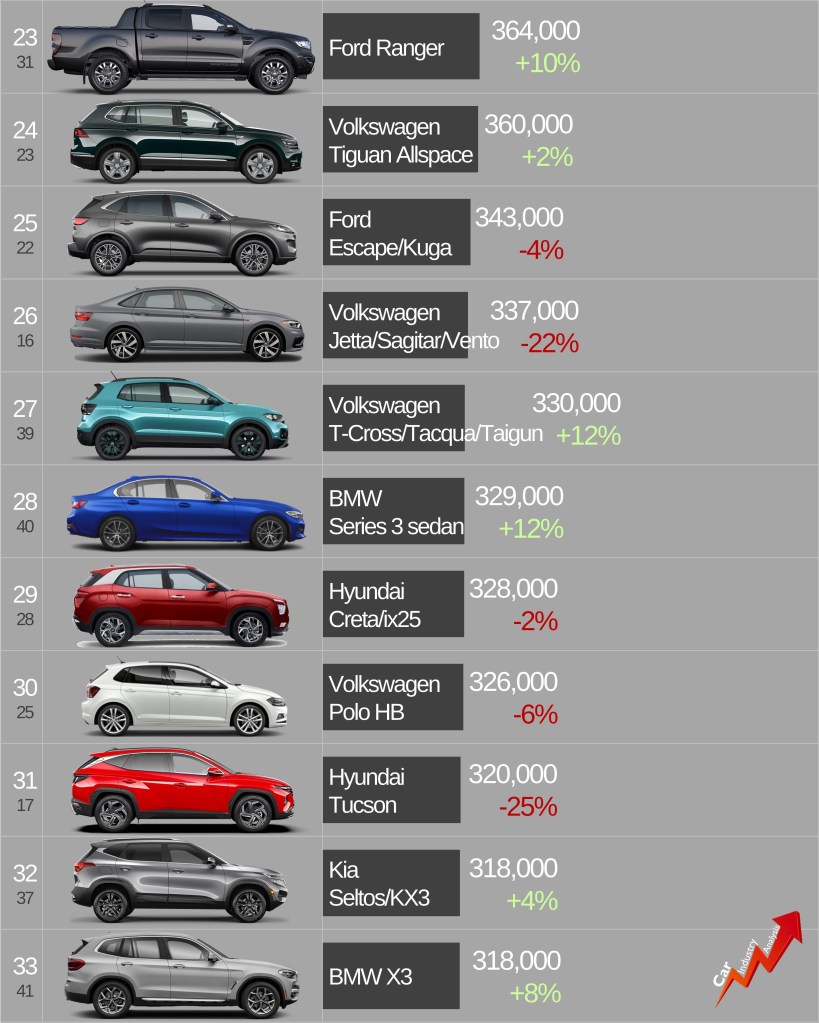
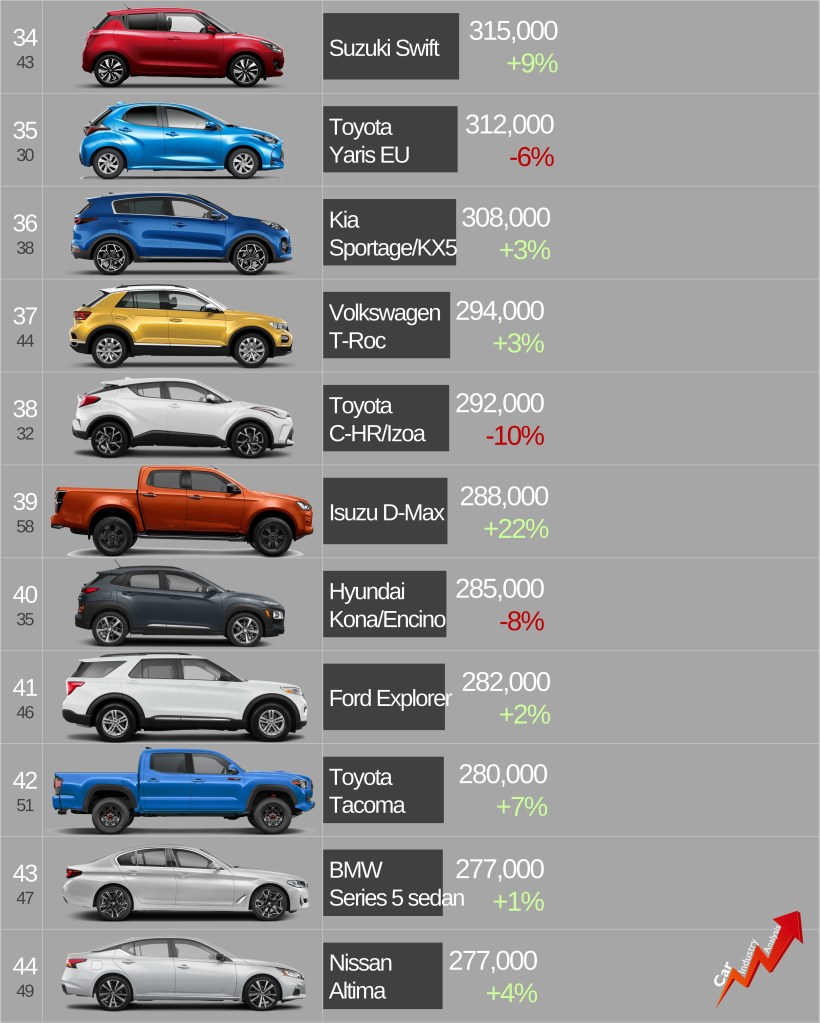
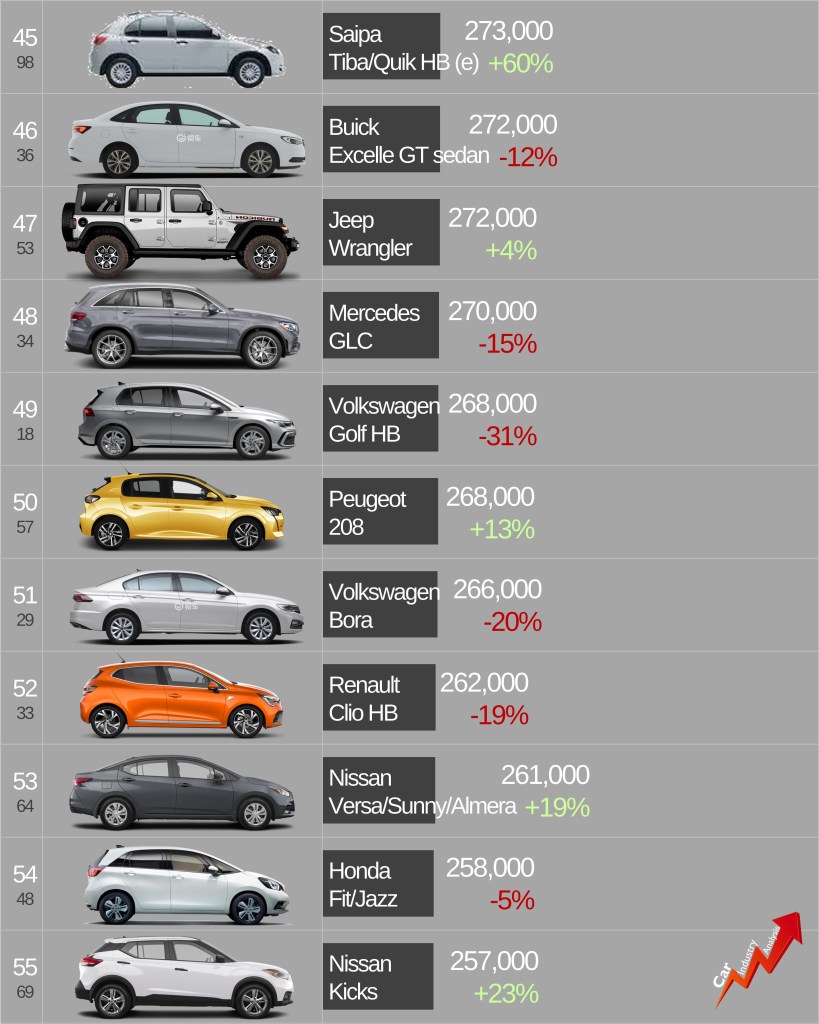
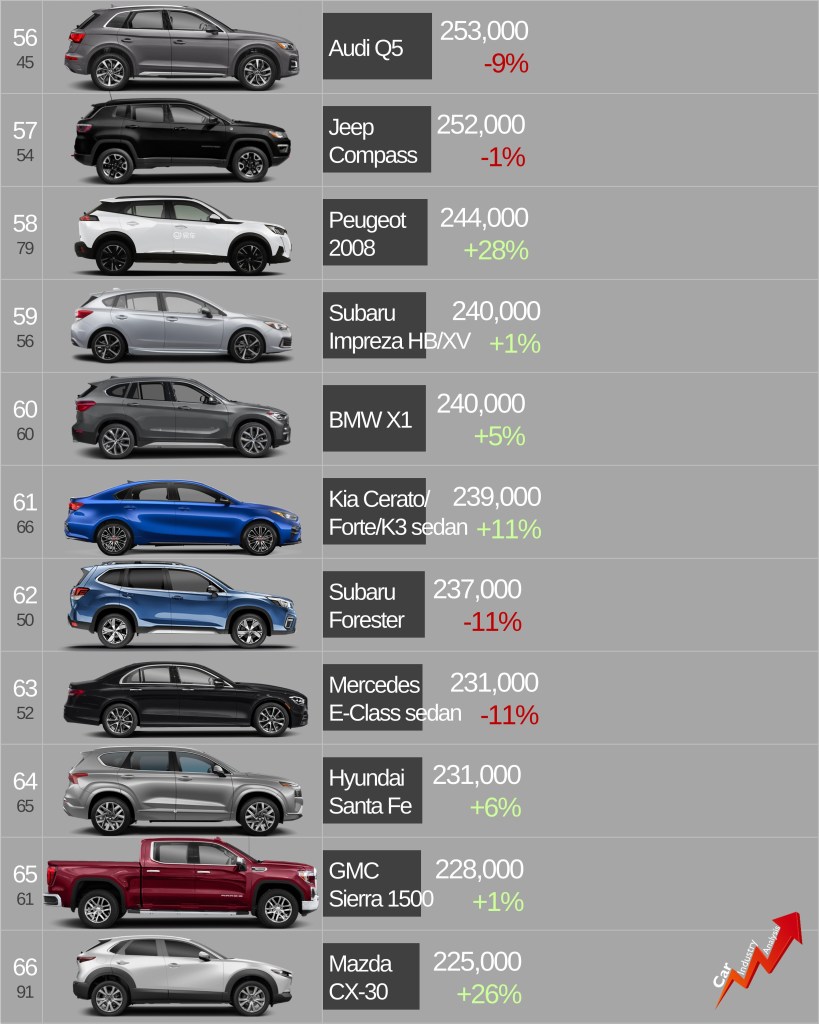
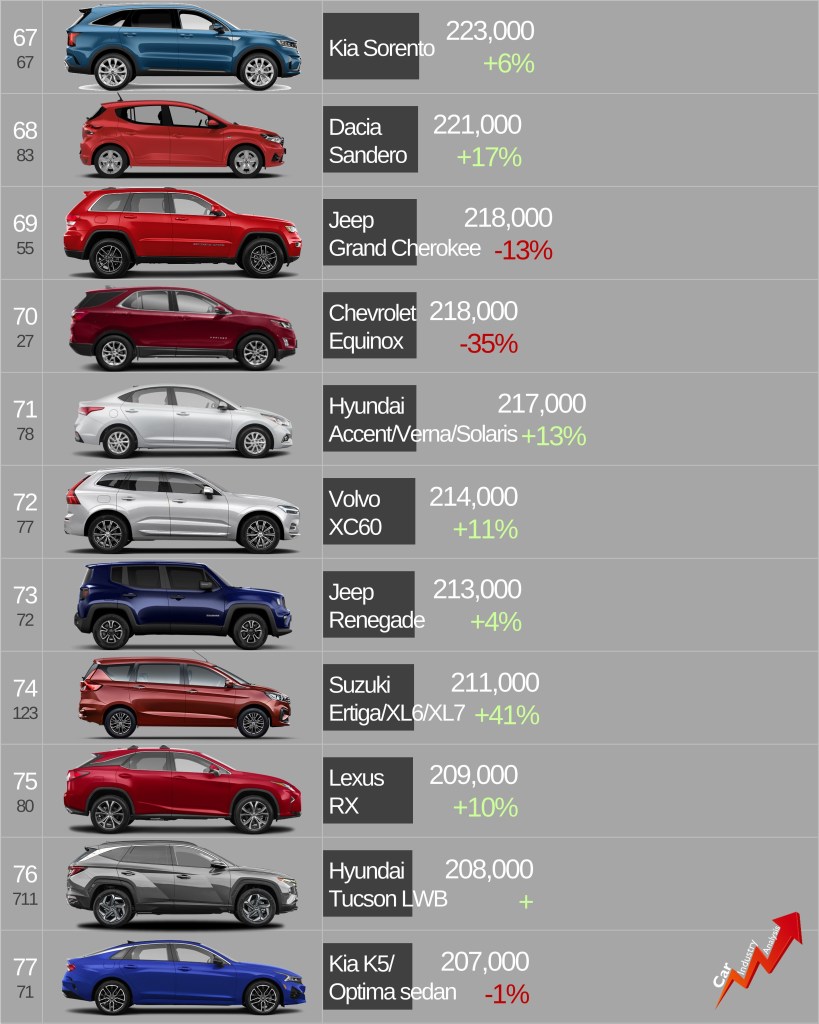
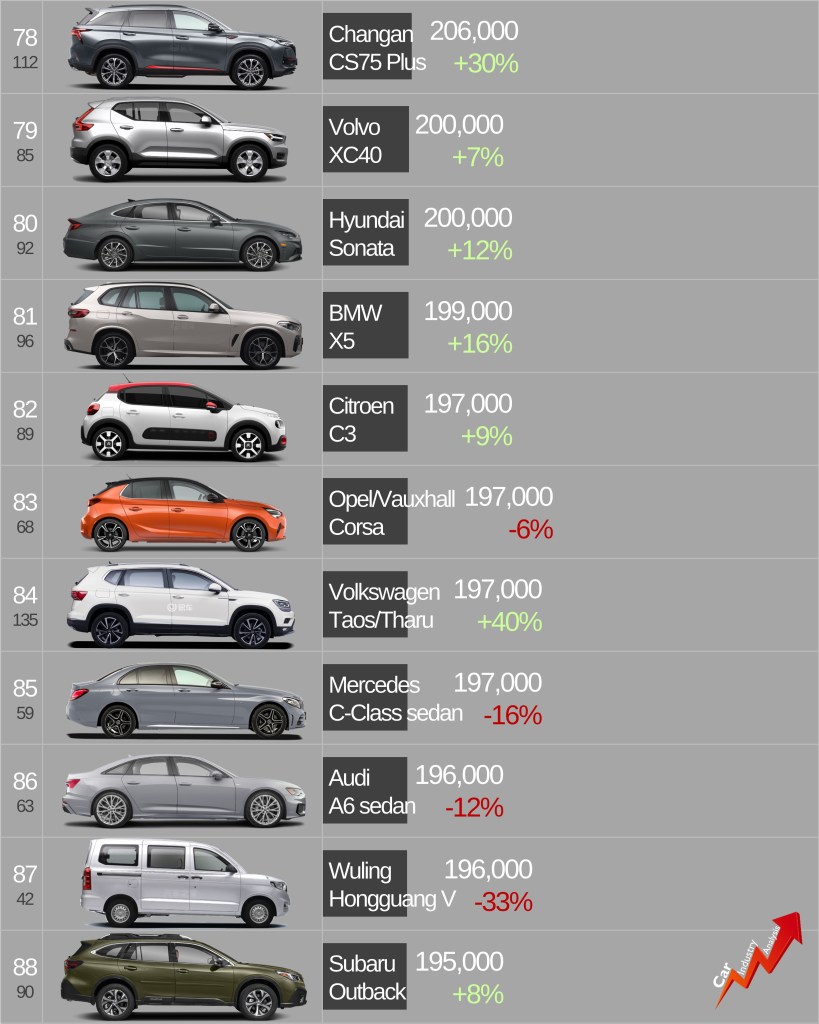
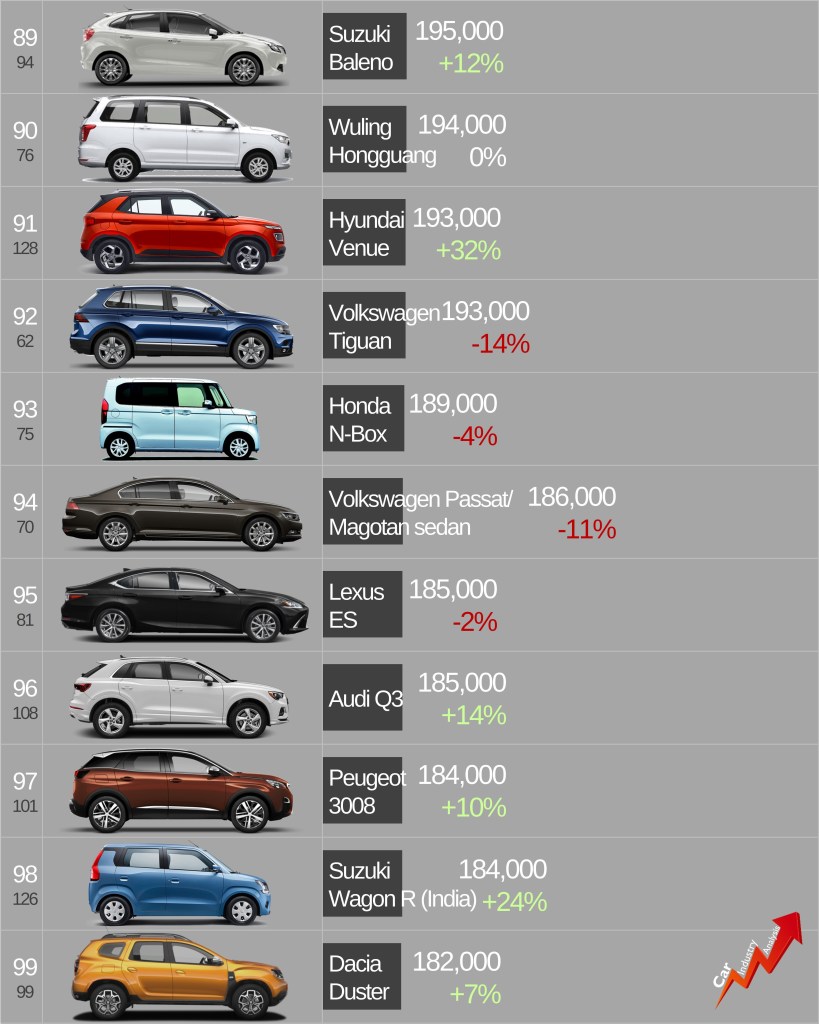
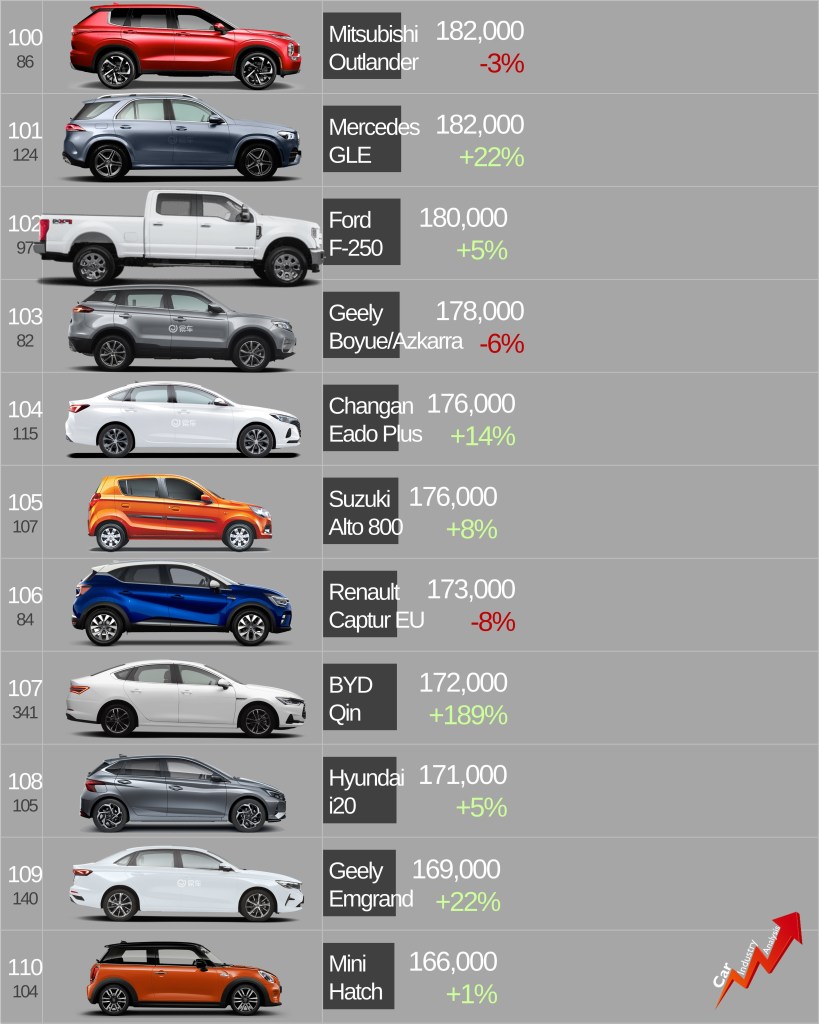
Big losers
- Big American trucks. Will the electric versions help to boost sales?
- Volkswagen’s most iconic products: Jetta, Polo, Golf, Passat. Lack of availability, more competition, and SUV boom affected sales.
- Renault Clio, Chevrolet Equinox, Wuling Hongguang V.
Note: this ranking splits the models by bodytype and brand, with the exception of Opel/Vauxhall and Suzuki/Maruti.
The 106 markets include: Albania, Algeria, Andorra, Argentina, Australia, Austria, Azerbaijan, Bahrain, Belarus, Belgium, Bolivia, Bosnia, Brazil, Bulgaria, Canada, Chile, China, Colombia, Costa Rica, Croatia, Cyprus, Czechia, Denmark, Dominican Republic, Ecuador, Egypt, El Salvador, Estonia, Finland, France, Germany, Ghana, Greece, Guatemala, Hong Kong, Hungary, Iceland, India, Indonesia, Iran, Iraq, Ireland, Israel, Italy, Ivory Coast, Japan, Jordan, Kazakhstan, Kenya, Kuwait, Latvia, Lebanon, Liechtenstein, Lithuania, Luxembourg, Malawi, Malaysia, Malta, Mexico, Moldova, Monaco, Morocco, Netherlands, New Caledonia, New Zealand, Nicaragua, North Macedonia, Norway, Oman, Pakistan, Panama, Paraguay, Peru, Philippines, Poland, Portugal, Puerto Rico, Qatar, Romania, Russia, San Marino, Saudi Arabia, Senegal, Serbia, Singapore, Slovakia, Slovenia, South Africa, South Korea, Spain, Sweden, Switzerland, Taiwan, Thailand, Tunisia, Turkey, Uganda, Ukraine, United Arab Emirates, United Kingdom, United States, Uruguay, Uzbekistan, Venezuela, Vietnam, Yemen.
Special thanks to all the followers that shared the data or liaise with the right contact.



















Pingback: An electric car is among the 10 best-selling models in the world | EVspias
Pingback: 【悲報】世界で最も売れている自動車ランキングが発表。日本これどうすんの?w | 車まとめあんてなポータル
Pingback: 【悲報】世界で最も売れている自動車ランキングが発表。日本これどうすんの?w | ハリアー60
EVs only sell because governments use a pernicious cocktail of incentives and coercion to create an artificial market for them. Meanwhile, cynical EV automakers ruthlessly take advantage of this situation by collectively refusing to invest in R&D that would potentially make EVs viable in a rational automotive market. This results in technological stagnation, and the most egregious symptom of this is the exceptionally long charging times, which are unacceptably long.
There’s not a single good reason why charging an EV from a fully depleted to a fully charged battery should take more than a maximum of five minutes. Not a single one! And yet, incredibly, charging an EV takes a lot longer than five minutes, which is totally unacceptable. And contrary to what some dimwits seem to have been brainwashed into believing, sleeping, eating, shopping and toilet breaks have no impact whatsoever on charging performance and are thus of zero relevance.
LikeLike
Tesla’s federal tax subsidies of $7500/vehicle went away years before Tesla became a top 10 best seller! ZEV credits are expected to go to zero so quickly most analysts report Tesla’s earnings without the benefit of credit sales to other manufacturers who are still making gasoline vehicles. Meanwhile, GM has made 26 EV’s since last year and owes the government billions of dollars we will never see.
LikeLike
Tesla have not had the benefit of incentives in the US for years. Incentives in the UK have been rolled back, Yet still their order backlog continues to grow despite huge production increases. What you are saying may have been true 6 years ago, today it’s no longer true.
I agree charging times are important. It takes me about 3 seconds to charge my car from any charge level to full. It takes a lot longer to fill a car with gasoline or diesel. Many fossil fuel car owners have been brainwashed into believing that it is necessary to visit a fueling station periodically and wait next to your car while it fuels. How quaint.
LikeLike
The US and UK aren’t the only countries in the world, incentives on purchase price isn’t the only kind of incentive, and Tesla is not the only EV automaker in the world.
If you think it takes about 3 seconds to charge your car to 100 % capacity, then it is of utmost importance that you hand in your driver’s license ASAP, as you clearly lack the mental capacity to comprehend even the most basic of things. You are a danger to us all on the road.
The fact is that it takes several hours for your EV to charge, not 3 seconds. Moreover, the charging time is in no way affected by what you’re doing during this long-lasting downtime (hence it won’t make sense for you to attempt a retort by parroting the usual drivel about sleeping, eating, shopping and toilet breaks). But you’re obviously not bright enough to understand this.
LikeLike
English comprehension is important. You may have overlooked that I said it took me 3 seconds to charge my car. I said nothing about how long the car itself takes since that is irrelevant the vast majority of the time. By contrast your trusty fossil car requires you to wait while it fuels, mine does not.
I did take a 120 mile road trip today. Well within the range of my vehicle. No need to charge however I did have the opportunity to charge the vehicle at my destination. I left home with a 70% charge, my normal charge level. I arrived at my destination with approximately 50%. I charged the car while I was at my destination and it reached a charge level of 90%. On arrival home I arrived with 70%, exactly what I left with. Best of all the charging at my destination was free as was the parking.
I drove 120 miles spent 3 seconds of my time plugging in and did it all for free.
LikeLike
Your claim that it takes you seconds to charge your car is not something I’ve overlooked, it is a claim that simply isn’t true. If it were true, you would have been able to demonstrate it by unplugging the charger 3 seconds after you had plugged it into your EV, and your battery gauge would show 100 %. In reality, this would only have been possible if the battery level was already at 100 %.
The fact is that the time it takes you to charge your car includes the time it takes for you to wait for the charging to complete (yes, you do indeed have to wait, even though you’ve irrationally managed to convince yourself otherwise), and this charging downtime doesn’t go away because you consider it “irrelevant” or you’re “doing other things” or whatever other silly excuse you may think of.
From one post to the next you went from “I agree charging times are important” to “I said nothing about how long the car itself takes [to charge] since that is irrelevant the vast majority of the time”, thereby contradicting yourself. It’s a sad but unsurprising example of the kind of mental gymnastics you EV apologists need to resort to in order to maintain a positive view of your fundamentally flawed EVs.
So you better hand in your driver’s license ASAP.
As for your irrelevant anecdote about driving 120 miles, the only thing worth commenting is that you say that the charging was free, which in other words means that someone else was paying for your charging. The most likely reason for this “free” charging is that is a way to encourage adoption of EVs because they are not competitive on their own merit.
LikeLike
Sorry you are failing basic comprehension. It does take ME just 3 seconds to charge my car. In other words 3 seconds of my time is invested in the charging operation. The time the car takes while it is parked anyway is irrelevant to ME. This is especially true of home charging where one parks the car in the garage for hours on end. By contrast your trusty steed does require you invest 5 minutes of YOUR time to fuel your car. This seems to be lost on you.
As for the time I spend inside my home while the car charges is time that you would spend in identical circumstances than I. I suspect after parking your car at home you spend time on your property in the order of hours per day. All of that time your car is idle. It’s not a silly excuse it’s reality. Reality bites.
As for my free fuel. It was not provided for free to encourage EV adoption. It was provided free to encourage patrons like myself to visit. Some grocery stores often do the same to provide an additional incentive to spend your money at their establishment. It’s good business.
You suggest my trip is irrelevant. It is at least practical experience. What experience do you have other than for fueling fossil fuel vehicles? Your arguments regarding EV charging are theoretically based with no practical experience to verify your assertions. Other than stand next to your vehicle like a doofus while it fuels, how did you spend your time while it fuels, smell the fumes?
LikeLike
There’s nothing wrong with my comprehension, though there is certainly something fundamentally wrong with yours, so much so that you’re even unable to make the basic distinction between the performance of technology on the one hand, and your personal circumstances on the other.
It is of course possible to argue that favourable circumstances can mitigate the issues of long charging times, which nevertheless remain a reality. It is something else entirely to argue that the charging times themselves are short (or shortened) in those circumstances or because of them, yet this line of flawed thinking is surprisingly prevalent among lesser-minded people who convince themselves that buying an EV is a good idea. I suspect that it’s because a lot of EV buyers either suffer from post-purchase rationalization, or they are simultaneously susceptible to propaganda and resistant to facts.
LikeLike
Let’s go back to what you originally said.
“charging an EV takes a lot longer than five minutes”.
If I am understanding you (correct me if I am wrong) what you meant to say was “An EV takes a lot longer than five minutes to charge.”
The placement of the verb “charge/charging” is important. As stated by you originally it implies the action of charging is with the owner, in my example it places the action of charging with the technology”
My point is the time it takes an EV to charge is independent of the owners engagement in the process and therefore the ownership experience of an EV is superior to that of a fossil fuel vehicle. Delegating the responsibility of fueling over to the technology improves the ownership experience.
Once initiated it is both safe and advisable to walk away from an EV while it fuels. With fossil fuel vehicles you are required to remain with your vehicle during the fueling process. In some jurisdictions you are required to continually grip the fuel pump handle during the fueling process. You are required not to smoke or operate a cell phone during the fueling process. The car engine (and therefore heat and air) must be turned off during fueling. None of these restrictions apply to fueling an EV.
LikeLike
Whether or not the owner (or driver) of an EV is “engaged” in the charging process is beside the point. The issue here is the truly abysmal performance of the EV chargers themselves (both the chargers at public charging stations and the chargers found in people’s homes) and the failure of EV manufacturers to address it, as well as EV apologists like yourself who parrot pretty much the same condescending and dishonest slogans downplaying and trivializing this poor charging performance.
After all, there’s not a single good reason why it should take more than five minutes for an EV to charge from a fully depleted to a fully charged battery – not a single one! In the interest of technological progress, EV apologists should refrain from making silly excuses for the EV manufacturers, and instead start demanding that the manufacturers get their act together and innovate to the point where EVs reach performance parity with cars having a fuel tank and an internal combustion engine. That would be a lot more constructive than spouting and defending drivel like “it takes me X seconds to charge my EV” or the ubiquitous “you charge your EV while you sleep”.
LikeLike
You are making a classic mistake.
Fossil cars and EV’s use different technology. They are NOT the same. To expect different technologies to behave identically isn’t realistic. There are many technical reasons why a battery cannot be recharged as quickly as a fossil fuel car can refuel. You keep repeating there is no good reason. There are plenty.
Here’s another few reasons why EV’s are superior to fossil car when it comes to refueling.
1. Fraud. Thieves install skimmers on gas pumps to steal credit card and debit card numbers. Charging at home eliminates this possibility.
2. Safety. We’ve all had a spooky experience at an unfamiliar gas station at night, maybe a panhandler or suspicious person came out of the shadows. You keep looking over your shoulder. Fueling in your own home is much safer.
3. Cleanliness. Ladies often dislike pumping their own gas because of the smell of gasoline or diesel that gets on their hands or clothes. Electricity doesn’t smell.
4. Ubiquity. There are about 145,000 gas stations in the us. There are 100 million homes with a garage in the US. Many more places to charge your car than gas your car.
LikeLike
I am not making a classic mistake, but EV automakers most certainly are.
EVs deservedly vanished from the marketplace almost a century ago because they were not competitive, and after all this time one would have expected today’s EV automakers to have addressed the fundamental problem EVs suffered from before introducing new EVs the to the marketplace. As the abysmal charging performance of today’s EVs clearly demonstrates, however, one of these fundamental problems is still here a century later (!).
The purported “flagship” EV manufacturer, Tesla, turns 20 years next year, and has had ample time to fix the charging time problems, but it has not done so, and have instead relied heavily on gimmicks in an apparent attempt to deflect from its massive shortcomings. Other EV manufacturers have followed Tesla’s unfortunate precedent. This is completely unacceptable.
It makes no sense to suggest that expectations should be different merely because technologies are different. Batteries and chargers perform the very same function in an EV as a fuel tank and a gas pump do in a car powered by an internal combustion engine. If EV engineers cannot make this kind of technology perform competitively with functionally equivalent technology in similar types of vehicles using the kind of propulsion technology currently dominating the marketplace, that only means the technology is unfit for purpose, and either needs to be improved to the point where it is competitive, or replaced with a different kind of technology that is. EV automakers refuse to do this, instead they seem to be content with repeating a classic mistake that caused the EV market to implode about a century ago, and EV apologists gloss over it with dishonest and nonsensical rhetoric instead of taking manufacturers to task for it as they should have done had they been actual proponents of a future for EVs.
In a properly functioning marketplace, none of this would be an issue. EVs would simply be outcompeted for the second time by well-performing cars using internal combustion engines or other kinds of suitable technologies. If the EV survived in the marketplace at all, it would be as a niche vehicle for a small selection of use cases and as the vehicle of choice for a small group of nutters (like people who would be willing to pay extra for an inferior product because they were afraid of the dark or anxious about their wives inadvertently getting their hands dirty every now and then).
However, the current situation with political threats of restrictions or outright bans on cars with internal combustion engines has severely disrupted the marketplace in a negative sense. A consequence of this is that we could potentially see a not so distant future where the poorly designed and poorly performing EVs of today will remain the only choice for drivers, with the significant attack on people’s automotive freedoms it will entail. Hence the urgent need for EV manufacturers to address the fundamental shortcomings of their EVs, which is not done with the help of antics such as whataboutism, making people parrot silly slogans or arguing that people need to accept and adapt to inferior technology (even though some consumers are so obedient they brainwash themselves into believing it is superior), but by the manufacturers themselves heavily investing in R&D and innovation and focusing on meeting consumer expectations instead of government expectations. After all, as long as EV engineers decide to utilize battery and charging technology in EVs there’s not a single good excuse why it should take more than five minutes for an EV to charge from a fully depleted to a fully charged battery – not a single one!
LikeLike
You are totally stuck on EV charging times like it is the only factor of importance in choosing a vehicle. AND you apply a gasoline charging model to an EV which only highlights the differences, refusing to accept an alternative fueling strategy by dismissing other strategies as silly. It’s like expecting an iPhone to work the same way as an Android phone and complaining about feature X being absent or not as good.
The ownership experience for an EV owner is SUPERIOR than that of a gasoline car, even when ONLY considering fueling the vehicle. This is why they are sold out for a year or more. Some people such as yourself cannot conceive of an alternative to what you are used to doing, which is fine there are plenty of other people who do appreciate the benefits of an EV. Especially when you consider ownership experiences beyond simply fueling the vehicle. Fueling a vehicle is a necessity, not the reason the vehicle was built. When comparing other factors EV’s are head and shoulders better than gasoline vehicles.
Continue to drive your gasoline vehicle and replace it with another. It is a free world. The rest of us have smelled the roses while you are stuck smelling fumes. That’s your choice and you are welcome to it.
LikeLike
Charging time is not some weird esoteric feature of little importance – it’s a major issue affecting the very basics of the car! My appropriate focus on the issue is due to the fact that EV automakers continue to ignore finding a solution to it even as government policies in several countries around the world are put in place to force people to switch to this type of perennially underdeveloped vehicle.
Your clumsy iPhone vs Android analogy falls flat on its face, and does in no way illustrate what the problem is about. A better analogy would be people accustomed to broadband Internet connections replacing them with much slower dial-up connections, a technology of the past that was largely abandoned years ago due to the emergence of better-performing technology. Now imagine someone coming forth arguing that dial-up connections are not inferior, merely different, nay, actually superior, that watching a video only takes 1 second to prepare because that’s the time it takes the viewer to press “play”, while the hours upon hours it now takes to download the data using an “alternative downloading strategy” is irrelevant because it’s the computer that’s downloading it and not the viewer, who is not burdened because he could spend those hours doing something else, and he even intended to go to sleep in that case anyway, so it won’t have an impact on his life. This analogy would actually convey a dimension of the irrationality and backwardness of the EV apologists’ position.
Now let’s expand the analogy and envision a scenario in which politicians in many countries worldwide implement a ban on broadband connections in just a few years’ time, after which only dial-up connections will be permitted, even though dial-up is still not able to compete with the superior, ubiquitous and well-established broadband connections. The scenario is of course absurd, but it eerily mirrors what is happening in the automotive world these days, with politicians seeking to ban cars with combustion engines and forcing people to buy inferior EVs. Hence the huge importance of improving EVs to the point where they are competitive with cars with combustion engines if EVs are the only kind of cars we’ll be allowed to buy in the near future.
Your description of EV ownership experience smacks of post-purchase rationalization. I understand that very well – after all, an EV costs a lot of money, even when tax payers are forced to pick up part of the bill, and while traditional automobiles are mobile, poorly designed EVs are forced to spend a lot of their time immobilized, connected to an outlet as if on perpetual life support (a rather fitting image very much conforming both technologically and commercially with reality itself). No wonder you need to tell yourself made-up stories about how EVs provide a SUPERIOR (in capital letters, no less) ownership experience, and stubbornly deflect any comment to the contrary with blatantly dishonest boilerplate rhetoric.
I have often pondered why many of those who speak most fondly about EVs are usually the ones who most vehemently object to the idea that EVs need to have battery and charging technologies that can compete performance-wise with a fuel tank and gas pump, perhaps the one remaining major obstacle to voluntary mass-adoption of EVs in the marketplace. I hypothesize that it mainly has to do with two things. One is the sociological dimension, where EV apologists adopt and cling to an identity as environmentally conscious early adopters, with their EV being the virtue signalling device that gives them the opportunity to pose as morally superior to and more tech-savvy than the average driver. The other is the financial dimension, where EV apologists benefit from all kinds of incentives introduced by government policies trying to create an artificial market for EVs to compensate for their lack of competitiveness in the hope that this will eventually improve. Both of these dimensions would be severely undermined by EVs becoming competitive and gaining market share on their own merit. No wonder there is so much resistance among EV apologists…
On that note I have to wrap up this discussion, as my circumstances do not allow me to continue spending time parsing and responding to the peculiar output of your EV apologist mind. May you have a wonderful summer, and don’t forget to hand in your driver’s license.
LikeLike
I own a Tesla Model Y. Have driven it ~17,000km, which includes about 5000km of long distance road trips (i.e. as much as 700km one direction), and ~12,000km of city driving.
There are some charging myths and reality that should be acknowledged:
– Charging at home is slow, and that is absolutely OKAY for daily driving needs. With a basic charger setup at home, I can fully refuel overnight (500km range), ample for most human daily commutes < 100km, and I never need to go to a 3rd party charger in my own city, ever.
– Charging for road trips is FAST, faster than you think. Tesla Superchargers range from 150kw to 250kw systems, and can recharge in about 20-40 minutes, never hours.
This is absolutely longer than it takes to fuel a gas car (about 5 minutes), but for road trips that doesn't really matter and here is why:
The other needs which were dismissed as irrelevant (eating, toilet breaks) actually do matter, as we are humans that need to eat and use the toilet (did I have to write that?) With a gas car, each of these activities happens consecutively. With an EV, as other users point out you can plug in walk away and do your business, coming back to a charged vehicle. This matters because ultimately the extent to which we should care about charging is the extent to which it IMPACTS the driving experience. I would assert that on all of my road trips to date, the time it takes to charge the EV was absolutely a non-issue (i.e. never had to 'wait' for a charge).
However, there are legitimate critiques in regard to charging vs gas:
1) Limited locations and availability: even with an extensive supercharging network from Tesla, my options are more limited than with gas stations on a road trip. I therefore have less flexibility to choose different routes. More charging infrastructure will certainly help in this regard, and needs to keep pace with exponentially increasing EV adoption.
2) There are two EV realities today: Tesla and non-Tesla. Tesla Superchargers are the gold standard. They are fast, reliable and the experience is so seamless from how it integrates with my vehicle (plans the route with charging for me, recognizes my vehicle & account when I arrive without any input and payment is all handled automatically). All other fast charging networks are still lagging, either on reliability (i.e. some stalls regularly not working or not working properly), require 3rd party applications (Although some of these are really not that hard to setup and then use regularly). This is not insurmountable, and especially with Tesla exploring opening up their charging network to other users + further charging expansion plans from a variety of 3rd parties.
Regarding subsidies: I received no subsidy for my Model Y purchase (was not eligible in Canada). My energy is not subsidized either, I pay the going electricity rate.
Myth or reality: EV charging is free – Myth, generally speaking there is a cost, and it is usually far less than the equivalent gas.
My cost to charge my vehicle has been:
12,000km city driving + home charging: CAD $185
5,000km Road trips + 3rd party charging: CAD $200 (note only about 2500km required paid Supercharging. For Trips under 400km I was able to charge at my destination be it hotel, cottage etc. and in 90% of cases paid comparable rate to at home for slower charge or was freely provided).
more than happy to answer questions, share further real world experiences (i.e. EVs in Canadian winter, range questions, maintenance, and even full-self drive / assisted driving)
LikeLike
You are regurgitating pretty much the same irrelevant drivel as your fellow EV-tard parrot above did before you, without adding anything new, certainly nothing of relevance, and nothing which disproves what I’ve stated. All you’ve demonstrated is that you have way too much time on your hands to waste, which is no surprise, seeing as you own a slow-charging EV.
I won’t waste any of my time and effort on you, though, since you’re too brainwashed to be receptive to reason. It is, however, of utmost importance that you urgently hand in your driver’s license, since your impaired mind may negatively affect your performance when you’re driving. Instead of spending time behind the wheel, you could spend it on the toilet. After all, not only did you have an epiphany that you need to use the toilet, but your output is also a lot more suited in the toilet than on this website. Have fun!
LikeLike
Pingback: La gran derrota del coche europeo: la lista de los más vendidos en el mundo augura malas noticias - ISV
Pingback: Xataka – La gran derrota del coche europeo: la lista de los más vendidos en el mundo augura malas noticias – Yacal
Pingback: La gran derrota del coche europeo: la lista de los más vendidos en el mundo augura malas noticias - Ocio24
Pingback: La gran derrota del coche europeo: la lista de los más vendidos en el mundo augura malas noticias
Pingback: The great defeat of the European car: the list of the best sellers in the world portends bad news - Dituna
Pingback: La gran derrota del coche europeo: la lista de los más vendidos en el mundo augura malas noticias - SN Tecno
Pingback: La gran derrota del coche europeo: la lista de los más vendidos en el mundo augura malas noticias – Consultores Lizarazo.net
Pingback: La gran derrota del coche europeo: la lista de los más vendidos en el mundo augura malas noticias - Mirando la Hidrovía
Pingback: What Was The Best-selling Car In The World In 2021? | 1 Beauty Tips
Pingback: What was the best-selling car in the world in 2021? - health gov
Pingback: Cele mai vândute mașini din 2021 ⋆ zoso blog
Why 45th car has Low quality photo ? its Iran Saipa car & its name is Quik , here the official website :
http://www.saipacorp.com/fa/allproducts/Saipa/quik
its review (in Persian) :
https://www.khodrobank.com/cars/%D8%B3%D8%A7%DB%8C%D9%BE%D8%A7/406/%DA%A9%D9%88%DB%8C%DB%8C%DA%A9
LikeLike
Pingback: unable to sell them in the rest of the world - Meds White
Pingback: What were the top 10 best-selling models worldwide in 2021? – Auto Review Journals
Pingback: Grâce à Tesla, une voiture électrique fait son entrée dans le top 10 mondial
Pingback: Grâce à Tesla, une voiture électrique fait son entrée dans le top 10 mondial - BonneInfo
Pingback: Grâce à Tesla, une voiture électrique fait son entrée dans le top 10 mondial -
Pingback: it is Asia that dominates the ranking of the 20 best-selling cars in the world – geaRXNews
Pingback: Ni Europa, ni EEUU: es Asia la que domina el ranking de los 20 coches más vendidos en el mundo - .·:·. AMAXOFILIA
Pingback: Top 100 worldwide sales. How are the French classified? - Ace Mind
Pingback: Tesla Model 3 was a Top 10 best-selling car worldwide in 2021 – Tricks and Tips
Pingback: Tesla Model 3 was a Top 10 best-selling car globally in 2021 | Future News
Pingback: Tesla Model 3 was a Top 10 best-selling car globally in 2021 - CHARGINGRENTALS
Pingback: Tesla Model 3 was a Top 10 best-selling car globally in 2021 – TSLA Investors
Pingback: Tesla had a top 10 car sold worldwide in 2021: could it reach the top 5 in 2022? – Tricks and Tips
Pingback: Tesla Had A Top 10 Selling Car Globally In 2021: Could It Crack The Top 5 In 2022? - NextWeb News
Pingback: Tesla Had A Top 10 Selling Car Globally In 2021: Could It Crack The Top 5 In 2022? – Simply Invest Asia
Pingback: Tesla Had A Top 10 Selling Car Globally In 2021: Could It Crack The Top 5 In 2022? - News Portal by AfricaX
Pingback: Tesla Had A Top 10 Selling Car Globally In 2021: Could It Crack The Top 5 In 2022? – Daily Car Care
Pingback: Tesla Had A Top 10 Selling Car Globally In 2021: Could It Crack The Top 5 In 2022? - STOCKOMICS
Pingback: Tesla Had A Top 10 Selling Car Globally In 2021: Could It Crack The Top 5 In 2022? - Save Cars
Pingback: Tesla Had A Top 10 Selling Car Globally In 2021: Could It Crack The Top 5 In 2022? | The Meta Future
Pingback: Tesla Had A Top 10 Selling Car Globally In 2021: Could It Crack The Top 5 In 2022? – LibertyInternationalPartners
Pingback: Tesla Model 3 in top 10 best-selling cars of 2021 – Tricks and Tips
Pingback: Tesla Model 3 was the 10th best-selling car in the world in 2021, could become the top 5 in 2022 – Tricks and Tips
Pingback: Tesla Model 3 Was 10th Best-Selling Car Globally In 2021, Could Go Top 5 In 2022 - H10 News
Pingback: Tesla Model 3 Was 10th Best-Selling Car Globally In 2021, Could Go Top 5 In 2022 – Scrap Car Removal Service
Pingback: Tesla Model 3 Was 10th Best-Selling Car Globally In 2021, Could Go Top 5 In 2022 – USA All Americans NEWS™
Pingback: Dünyanın en çok satan otomobilleri belli oldu! - Teknomy
Pingback: Tesla Model 3: στο top-10 των παγκόσμιων πωλήσεων το 2021 ! - CarTalk.gr
Pingback: Dünyanın en çok satan otomobilleri belli oldu! - Kibris Web Haber
Pingback: Tesla Model 3 Was 10th Best-Selling Car Globally In 2021, Could Go Top 5 In 2022 - blog
Pingback: Ranking 2021: Los autos más vendidos del mundo desarman mitos y confirman estilos - One Radio 107.3
Pingback: Peringkat 2021: Mobil terlaris di dunia melucuti mitos dan mengkonfirmasi gaya
Pingback: 2021-rangering: Verdens bestselgende biler avmystifiserer myter og bekrefter stiler
Pingback: Tesla Model 3 Was 10th Best-Selling Car Globally In 2021, Could Go Top 5 In 2022 – dominic-cooper
Pingback: Toyota, Toyota og mere Toyota - 4X4 israelsk terrænplads - COMM-KOBE
Pingback: Ilyen még nem volt - villanyautó van a Top 10-ben! - Villanyautósok
Pingback: It's never been like this before - there's an electric car in the top ten!
Pingback: Verrassend: deze dure SUV was vorig jaar de bestverkochte auto ter wereld - Nederlandse Nieuws
Pingback: Surprisingly, this expensive SUV was the world's best-selling car last year | Car - World News | TakeToNews
Pingback: FACCARA | Los autos más vendidos del mundo desarman mitos y confirman estilos
Pingback: The best-selling SUV in the world in 2021. It is the first SUV in history to reach the first place - Archytele
Pingback: El SUV más vendido del mundo en 2021. Es el primer SUV de la historia en alcanzar el primer puesto - Notiulti
Pingback: Dünyanın en çok satan otomobilleri belli oldu!
Pingback: Das meistverkaufte SUV der Welt im Jahr 2021. Es ist das erste SUV in der Geschichte, das den ersten Platz erreicht - Nach Welt
Pingback: THE TESLA MODEL 3 HITS GLOBAL TOP 10 BEST-SELLING CARS IN 2021 - SAGMJ
Pingback: Tesla Model 3 Enters Top 10 Best-Selling Cars Globally For 2021: Report - InsideEVs - Tesla
Pingback: Tesla Model 3 Enters Top 10 Best-Selling Cars Globally For 2021: Report - InsideEVs - Ecargyan.com
Pingback: 2023 Tesla Model 3: Performance, Price, And Photos
Pingback: 2023 Tesla Model 3: Performance, Price, And Photos - TopSpeed - Tesla
Pingback: BYD Continues To Increase Sales Of EVs (OTCMKTS:BYDDF) – Apk dg
Pingback: BYD Continues To Enhance Gross sales Of EVs (OTCMKTS:BYDDF) - Invesaid
Pingback: Tesla Model 3 Enters Top 10 Best-Selling Cars Globally For 2021: Report – InsideEVs - MarkBampi
Pingback: C'est historique : deux voitures électriques font leur entrée dans le top 10 mondial de 2022
Pingback: C’est historique : deux voitures électriques font leur entrée dans le top 10 mondial de 2022 – blog